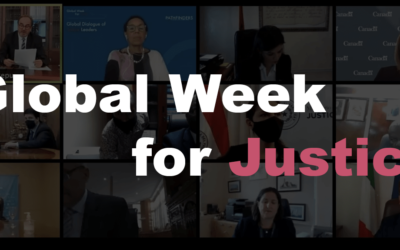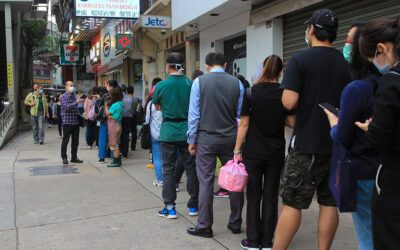The year 2020 will go down in history as the year when much changed. One thing seems to remain constant: the fact that the justice sector is slow to change. As a consequence, it seems to be missing a rather big boat.
Justice
An emerging ministers of justice movement
Since April, we have been calling for justice leaders of the world to get out of their national cubby holes and come together to share fears, failures, successes, and strategies, just like public health minister are doing. The COVID-19 crisis is too big and too unprecedented to deal with on your own national level. On 20 October, 22 ministers of justice did just that at the Justice for All in a Global Emergency meeting convened by Minister of Justice for Canada, David Lametti. It was a significant moment. For 90 minutes, they shared their experiences in dealing with the COVID-19 crisis. This is what I took away from it….
Un mouvement émergent des Ministres de la Justice
Depuis le mois d’avril, nous appelons les leaders de la justice du monde entier à sortir de leur cagibi national et à se réunir afin de partager leurs craintes, leurs échecs, leurs succès ainsi que leurs stratégies, comme le font les ministres de la santé publique. La crise du COVID-19 est trop importante et trop inédite pour être uniquement traitée au niveau national. C’est justement ce qu’ont fait 22 Ministres de la Justice le 20 octobre dernier lors de la réunion “Justice pour tous dans une situation d’urgence mondiale” convoquée par le ministre de la justice du Canada, David Lametti. Ce fut un moment important, pendant lequel ils ont partagé leurs expériences de la crise du COVID-19. Voici ce que j’en ai retenu…
Justice for children in detention during the pandemic
It is increasingly clear that the direct and indirect impacts of the global COVID-19 pandemic are not borne equally, hitting the most marginalised and vulnerable the hardest. While the impact of COVID-19 on prison populations has garnered some international attention, this attention has mainly focused on adults. Children in detention have been largely overlooked, despite being disproportionally vulnerable to health risks arising due to the conditions in which so many are being held.
Justice for All and the Economic Crisis
As COVID-19 plunges the world into its most serious economic crisis for a century, a surge in demand for justice is inevitable. The impact on justice systems will be enormous. Already battered by the pandemic and by the strains of designing and regulating lockdowns, they should expect millions more people to need help with evictions and job losses…
Crafting a Lasting, Global Legacy for George Floyd
This moment is a fitting one to consolidate a body of work by activists, academics, and other civil society organisations into an international instrument capturing our shared commitment to finally eradicating police brutality everywhere. But are resolutions and debates are an adequate and constructive response to the global outcry? The time and resources of the African Union would be better spent consolidating work into a binding standard against which all states should be monitored and evaluated.
Public Service Leadership: lessons from #BlackLivesMatter
Two NHS leaders from different generations, and different points of the institutional hierarchy, reflect on the impact of the Black Lives Matter resurgence within the NHS and offer three reflections for public service leaders.
The Freedom to Change – great power requires greater responsibility
Global society is in a moment that history books will recount well into the future. We have entered an era that was foreseen, but also emerged with the intensity of a slap to the face. The time for serious change has arrived. People invented the systems and the rules that we live under, and people have the power to change them.
Justice in a Global Emergency
A cry for justice is echoing around the world. In the US millions of people are marching to demand changes to the failures of the American justice system. In Mali, crowds gathered to demand change to a justice system that is considered corrupt. The cry for an independent judiciary was loud on the streets of Beirut last weekend. And the demand for justice will continue to grow. But there is a better way. Here are our recommended next steps.
A World in Which Many Worlds Fit
In our dreams for a post-COVID world, what should we demand of our international relations and international public good institutions? What does it mean to de-colonise and transform development and humanitarian enterprise so that it is anti-racist within and without? We want to offer some thoughts.
More from Global Dashboard
Let’s make climate a culture war!
If the politics of climate change end up polarised, is that so bad? No – it’s disastrous. Or so I’ve long thought. Look at the US – where climate is even more polarised than abortion. Result: decades of flip flopping. Ambition under Clinton; reversal...
Big Elephants and Small Islands: getting beyond the New Aid Orthodoxy
Official development assistance (ODA) – or aid – is a small but conspicuous pillar of the international order, and its frailties are being exposed by COVID as surely as those of the other foundations of this order. The assumptions underpinning aid and its management...
Uncertainty and Humanitarian Action: What Donald Rumsfeld can teach us
Since its onset, one striking feature of the coronavirus pandemic (COVID-19) has been the narrative power of its novelty. This global narrative depicts COVID-19 pushing humanity towards a ‘historical divide’ of BC and AC (before and after COVID-19), where unknown,...












